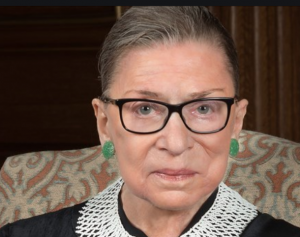U.S. Supreme Court Justice Ginsburg dies, sets up ‘remarkably contentious’ nomination battle (Updated)
by September 18, 2020 7:32 pm 1,276 views

U.S. Supreme Court Justice Ruth Bader Ginsburg died Friday (Sept. 18) at 87. Her death is likely to create a political fight if President Donald Trump submits a nominee prior to the upcoming election. Senate Republicans in 2016 refused to vote on a nomination by President Barack Obama when Justice Antonin Scalia died earlier that year.
The court reported that she died in her home after a battle with pancreatic cancer. Chief Justice John Roberts said the nation “lost a jurist of historic stature.” She was the first Jewish member of the Court, and is one of only four women to serve as a justice.
“Today we mourn, but with confidence that future generations will remember Ruth Bader Ginsburg as we knew her – a tireless and resolute champion of justice,” Roberts noted in a statement.
In a statement prior to her death, Ginsburg said: “My most fervent wish is that I will not be replaced until a new President is installed.” Political historian Jon Meacham said Friday the politics to replace Ginsburg will be “remarkably contentious.”
Ginsburg, who spoke Sept. 3, 2019, to a large audience at Simmons Bank Arena in North Little Rock, was nominated to the Supreme Court by President Bill Clinton and began serving on the Court on Aug. 10, 1993. Prior to that, she was nominated by President Jimmy Carter to serve on the U.S. District Court of Appeals for the District of Columbia Circuit.
Skip Rutherford, dean of the Clinton School of Public Service with the University of Arkansas, said Justice Ginsburg was the most popular speaker the school has hosted in Little Rock.
“Of the more than 1,400 speakers who have been part of our series, Ruth Bader Ginsburg by far drew the largest crowd, and we could have probably filled two Simmons Bank Arenas. I will be forever grateful that many of our students and graduates had the opportunity to be there. I also had the special privilege of joining a small group for dinner with Justice Ginsburg after the program, where she was engaging and inquisitive. Among the topics we discussed were public service and civil rights,” Rutherford said in a statement to Talk Business & Politics.

The Court’s next term begins on Oct. 5, meaning upcoming cases – including the future of the Affordable Health Care Act (ObamaCare) – will be heard by eight justices, with five justices considered conservative and three viewed as liberal.
U.S. Senate Majority Leader Mitch McConnell, R-Ky., in 2016 refused to hold a hearing or vote on Judge Merrick Garland after being nominated by President Obama after the death of Justice Scalia. McConnell said at the time the upcoming presidential election should be held first before a new judge is nominated. McConnell has since said he’d not follow that same strategy if a Republican President were to nominate a judicial candidate prior to a presidential election. Late Friday, McConnell issued a statement that he would indeed hold a hearing on a nominee submitted by President Trump.
President Trump on Sept. 9 issued a list of people he would consider nominating to the court if an opening occurred. One name on the list was U.S. Sen. Tom Cotton, R-Ark. Following are the other names on Trump’s list.
• Judge Bridget Bade, U.S. Court of Appeals for the Ninth Circuit
• Kentucky Attorney General Daniel Cameron
• Paul Clement, partner with Kirkland & Ellis LLP
• Judge Stuart Kyle Duncan, U.S. Court of Appeals for the Fifth Circuit
• Steven Engel, assistant attorney general for the Office of Legal Counsel of the U.S. Department of Justice
• Noel Francisco, former U.S. solicitor general
• Judge James Ho, U.S. Court of Appeals for the Fifth Circuit
• Judge Gregory Katsas, U.S. Court of Appeals for the District of Columbia Circuit
• Judge Barbara Lagoa, U.S. Court of Appeals for the Eleventh Circuit
• U.S. Ambassador to Mexico Christopher Landau
• Florida Supreme Court Justice Carlos Muñiz
• Judge Martha Pacold, U.S. District Court for the Northern District of Illinois
• Judge Peter Phipps, U.S. Court of Appeals for the Third Circuit
• Judge Sarah Pitlyk, U.S. District Court for the Eastern District of Missouri
• Judge Allison Jones Rushing, U.S. Court of Appeals for the Fourth Circuit
• Kate Todd, deputy assistant to the president and deputy counsel to the president
• Judge Lawrence VanDyke, U.S. Court of Appeals for the Ninth Circuit
In a statement on Twitter, Cotton noted: “I extend my condolences to the family of Justice Ruth Bader Ginsburg for their loss. She dedicated her life to public service, and now she is at peace.”
U.S. Sen. John Boozman, R-Ark., issued this statement on Ginsburg’s passing: “Sending my thoughts and prayers to the family of Justice Ginsburg. She battled cancer as fiercely as she made and defended ideas in the public square during her long public service career. The nation is thankful for her contributions and sends our condolences to her loved ones.”
